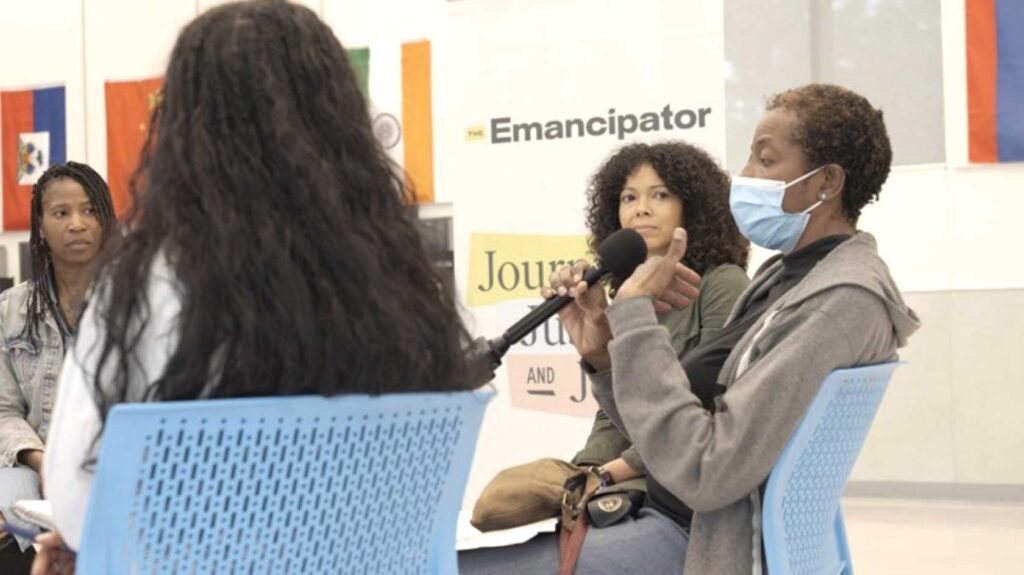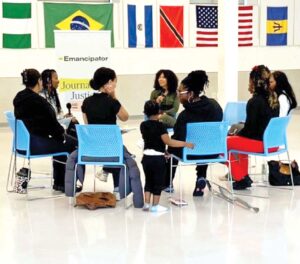
During an intimate roundtable discussion in a Dorchester school, seasoned and expecting mothers recently exchanged information and experiences about their journeys with breastfeeding and the benefits of mother’s milk.
“I’m a mom of two young children, and I was shocked and terrified to learn that Black women are three times more likely than white women to die from pregnancy-related complications,” said Amber Payne, a discussion convener who serves as publisher and general manager of The Emancipator, a Boston-based nonprofit digital magazine.
“We are also less likely than white women to meet our own breastfeeding goals,” she said.
Payne and local radio host and breastfeeding advocate Pamela Cesar began the discussion in a meeting room at the Brooke Charter School by sharing their personal experiences with breastfeeding before opening the conversation up for the circle of participants.
“These listening sessions give us the opportunity to talk with people who are grappling with and living through these issues — at ground level,” said Payne. “They are experts on their own lives. They are also experts on what they need to thrive.”
Fabyola Faublas, an expecting first-time mother from Mattapan, attended the event hopeful that she would receive the information and support she needed to feel confident about breastfeeding her newborn when the time comes.
“That’s why I wanted to come, because I’m like I’m a new parent, I don’t know anything really about breastfeeding, so I wanted to come here and learn about any tips or challenges that people have gone through with breastfeeding and how I can avoid that or deal with it, and also just to inform myself about breastfeeding in general,” said Faublas.
Cesar offered her point of view as someone who experienced losing a child, in part because of formula-based milk provided by a hospital.
“My oldest was born at 32 weeks,” she said. “Despite that, I successfully breastfed her for almost two years and even had oversupply — but my son, who has since passed, was where I experienced complications. My son was also born prematurely in 2006, so breastfeeding wasn’t an option.”
He was given formula in the neonatal intensive care unit and developed necrotizing enterocolitis, an often-fatal bacterial condition linked to formula-feeding in neonatal infants, she said.
“My son Na’Kye is the inspiration for me advocating for breastfeeding within my community,” she said.
During the information exchange, Faublas and another first-time expecting mother, Brittany, were equally curious about how beneficial breastfeeding really is and how strongly they should consider it.
Lisa Mitchell, a registered nurse working in the Maternal Health Unit of Boston Medical Center, offered an abundance of advice both from her medical expertise and her personal experience as a mother of two now-adult children.
“I loved breastfeeding,” said Lisa. “I have to say, I was one of those moms that were very fortunate, I had pretty, very straightforward pregnancies with both children. And as a result, I wanted to always give back.”
While Lisa adopted nursing as a career later in life, she is adamant and passionate about the benefits of breastfeeding, not only for the baby but also for the mother.
“The benefits are amazing, not only for your baby, but if I’m going to speak for the mom, I felt such an energy and a clarity. I did not feel like I was weighted, or the weight of the world was on me. I felt empowered. I said, ‘I can feed my child.’ I felt invincible in many ways,” she said.
Mitchell breastfed both of her boys for 17 months before introducing them to other forms of nutrition. As she described her experience to the expecting mothers in the discussion, she was unwavering in her message that a mother’s milk is the best option.
“Moms are able to lose a lot of the extra weight and water weight that they developed during pregnancy. In reference to health and stress, the oxytocin that is released when you’re breastfeeding really does give you a high. It’s almost like a runner’s high that you can’t duplicate whatsoever,” she said.
“And the love and the bond and the calm and the serenity that you feel, in the strength and the womanhood and the being feminine and knowing that you have the power to give birth,” she added. “Men don’t have that power; we need them, but they don’t have that power to give birth like we do. And so, it is such a beautiful experience.”
Unfortunately, while Mitchell’s experience was idyllic, many Black and brown mothers do not experience the same ease when attempting breastfeeding for various reasons — with the necessity of going back to work high on the list.
In a National Institutes of Health study titled “Reflections of Black Women Who Choose to Breastfeed: Influences, Challenges and Supports,” Dr. Melanie Lutenbacher, Dr. Sharon M. Karp, and Dr. Elizabeth R. Moore conducted a controlled experiment to examine the experiences of Black women who chose to breastfeed.
The majority of women who participated were influenced by many factors in their decision to breastfeed. Still, most women found that what influenced them the most was the mentorship and guidance they received.
“All participants spoke of the importance of role models who contributed to their decision to breastfeed and then later as they breastfed their infants,” they reported. “Many participants did not identify any available role models, and to compensate, intentionally surrounded themselves with women who were either breastfeeding or had breastfed.”
A major hindrance to breastfeeding for Black women was having to switch to formula feeding when economic pressures forced them to return to their jobs or the classroom.
“[M]any participants found formula feeding easier when they returned to work. If they continued to breastfeed, they had to juggle work, breaks and pumping, sometimes without a supportive work environment,” said the report.
During the roundtable discussion, participants and facilitators were shocked to find that both expecting mothers in attendance weren’t even aware that they are legally entitled to a “mother’s room” in any work environment.
As the roundtable ended, the event facilitators conducted an activity where participants outlined the different obstacles and solutions they came up with during the discussion about breastfeeding and how they might move forward with the information they received during the exchange.
“Everyone’s experience is different,” said Payne during an interview after the discussion, “but I hope that by sharing our stories, we could also encourage [mothers] and ease their fears and anxieties around breastfeeding.”
Because Black women are so disproportionately affected by the lack of support surrounding breastfeeding their infants, The Emancipator continues to be committed to encouraging conversations like these to enlighten Black women further about their maternal options and rights and provide them community and support.
“As journalists,” Payne stated, “I think it’s critical to give people the opportunity and platform to advocate for themselves.”







